How a Highlands community helped survivors of Armenian earthquake
- Published
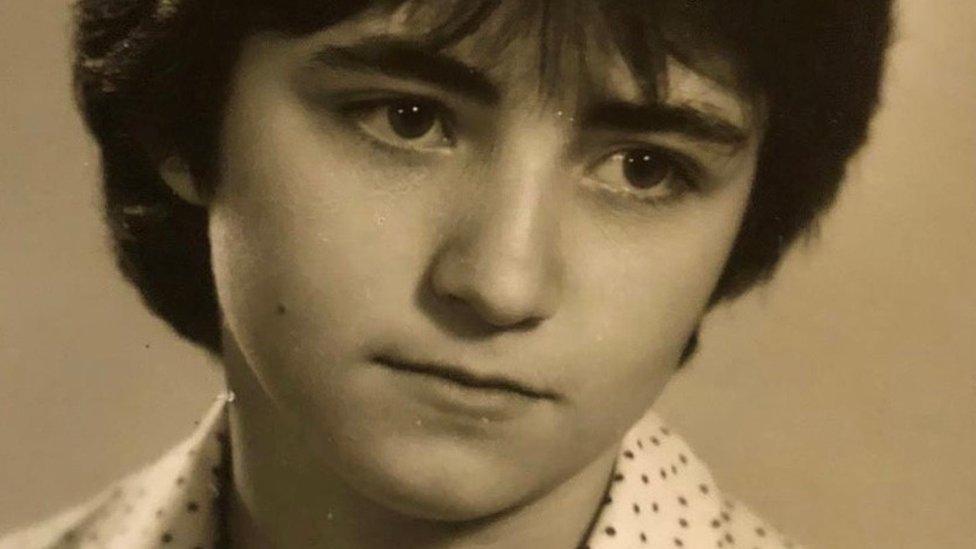
Larina Bichakhchyan was 14 when the earthquake hit in 1988
Larina Bichakhchyan's life changed forever when she survived an earthquake disaster in the then Soviet Union in 1988.
And 33 years later she has been recalling how support she received from a small community in the Highlands of Scotland helped her recover and inspired her future career path.
About 25,000 people were killed in the Spitak Earthquake on 7 December 1988.
Larina was 14 and at school when the 6.8 magnitude tremor struck tearing the building apart and destroying her home.
She was later to benefit from a fundraising and exchange programme set up by pupils and teachers at Dingwall Academy in the Highlands.
'There was nothing left, only ruins'
Larina was in her maths classroom in the Armenian city of Gyumri when the earthquake hit.
She said: "We were all shocked and paralysed as we didn't know what was going on until we saw the desk legs from the classroom above hanging through the ceiling."
Larina and her classmates fled through crowded corridors as the building collapsed around them.
Many children were killed by falling rumble but Larina managed to get outside to safety.
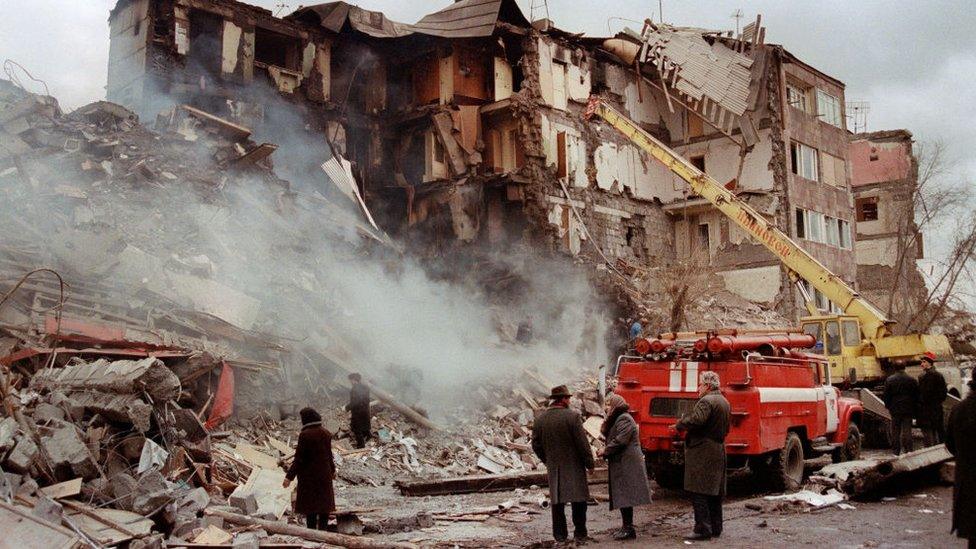
About 25,000 people were killed in the Spitak Earthquake on 7 December 1988
She made her way home through streets that were now almost unrecognisable due to the scale of destruction.
She said: "There was nothing left, only ruins. It was like Hell. I couldn't even imagine this scene in the worst horror movie.
"Along the streets there were corpses lying and you heard people crying from under the ruins."
"When I finally reached my home there was no-one there from my family.
"But then I saw my father running to me. It was like a miracle. Together we climbed on the ruins and started calling out for my mum."
Larina and her family lived on the fifth floor of an apartment block. Like all the other buildings on the street it had been completely destroyed.
Larina and her father feared the worst because they knew her mother had been at home when the earthquake hit, but they heard her crying out from under the rubble. She had been badly injured and was trapped.
Larina said: "We started with our own hands to dig into the ruins. Some other men rushed to help us and together we were able to at last get her out."
Larina's mother was the only survivor from the building. Later that day they were reunited with Larina's sister and injured brother.
They had to travel to Georgia to get medical help because local hospitals were overwhelmed.
"We were all really happy to find each other and so it didn't matter that we had lost everything in the earthquake," she recalled.
Fundraising efforts
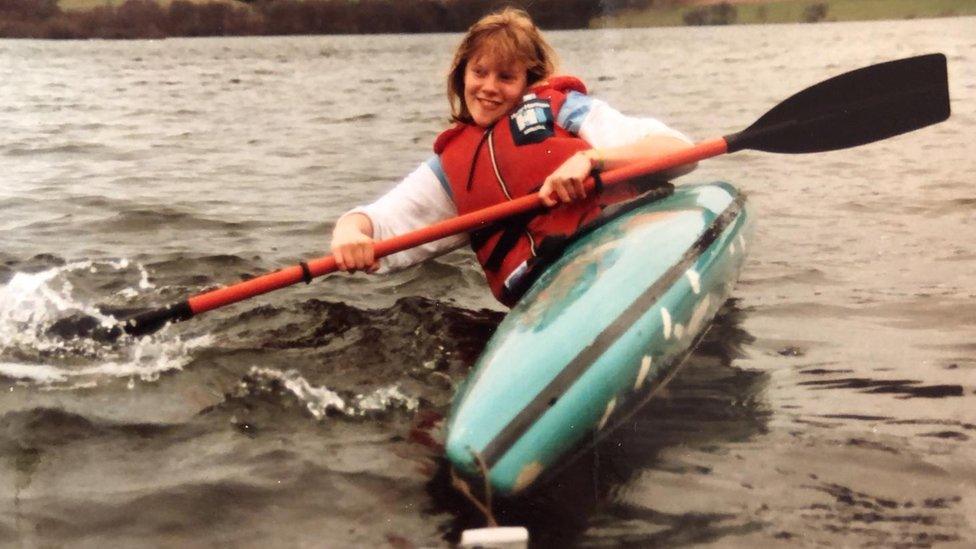
Marianne's family hosted Larina to Scotland
The images coming out of the disaster zone shocked the world.
International fundraising began to help with the rescue mission and provide support to the estimated 500,000 people left homeless in the middle of winter.
Dingwall Academy played a major role in collecting donations in Scotland with staff, including head teacher Alexander Glass and chemistry teacher Dr Kerr Yule, helping coordinate the efforts of pupils.
Ewen Ellen who was the head boy at the school at the time said: "We wrote a letter to every single secondary school in Scotland asking them to try to raise some funds for the Armenian Earthquake."
In Dingwall there was charity carol singing and a concert. Local businesses and organisations made contributions and children put in their own pocket money.
Ewen said: "We raised over £22,000. I remember an official from the Soviet Embassy coming up to collect the cheque. I guess it was a lot of money back then. I'd like to think it made a difference."
The Soviet authorities invited a group from Dingwall Academy, including Ewen, to visit Armenia to see the ongoing disaster relief work.
During the trip in August 1989 they went to the village of Nalband, which had been near the epicentre of the earthquake, and laid flowers on the graves of people who had died.
Exchange visit to Scotland
It was a difficult time for Larina and her family.
Left homeless they had gone to live with her uncle in the Armenian capital Yerevan.
The Soviet Union was beginning to disintegrate, power cuts were the norm and many shelves in shops were empty.
Larina, who had started learning English at school, was among a group of Armenian pupils selected to make a return visit to Scotland in September 1990.
She said: "It was a period when I was really down psychologically and it was kind of a boost. I felt so proud and so lucky.
"The most vivid memory I have, and the happiest one, is the greeting by the students and staff at Dingwall Academy when we arrived. We felt so special and I remember there was Scottish music with bagpipes."
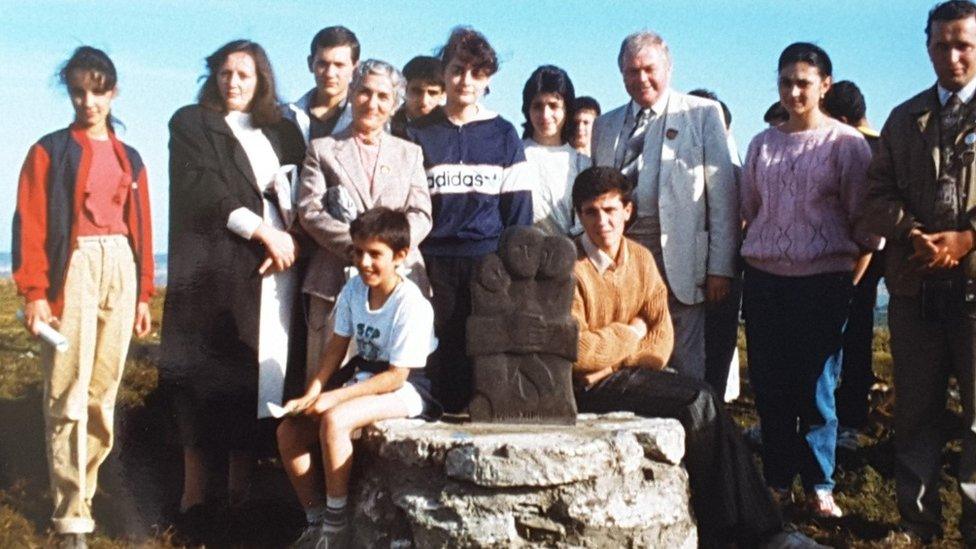
The unveiling of a friendship stone near Dingwall
The Armenians were put up in the homes of locals with Larina going to stay with the Ramsay family, near Strathpeffer.
Larina says the whole experience was like a "fairy tale".
Marianne Ramsay was about the same age as Larina and the pair became friends.
They recently got back in contact for the first time in more than 30 years.
Marianne said Larina was accepted as just another teenager in the house: "I remember she had very few personal belongings with her. I wanted her to have some nice things to wear so my Mum took us shopping and bought her jeans and some nice jumpers.
"I remember feeling really pleased and she was absolutely thrilled."
'This warmth has stayed with me'
The Armenian youngsters took part in lessons and were taken on day trips across Scotland.
But the highlight was an outing just a few miles up the road to Knockfarrell where a friendship stone brought from Armenia was erected at a spot known as the Cat's Back.
Larina said she has incredible memories of this event.
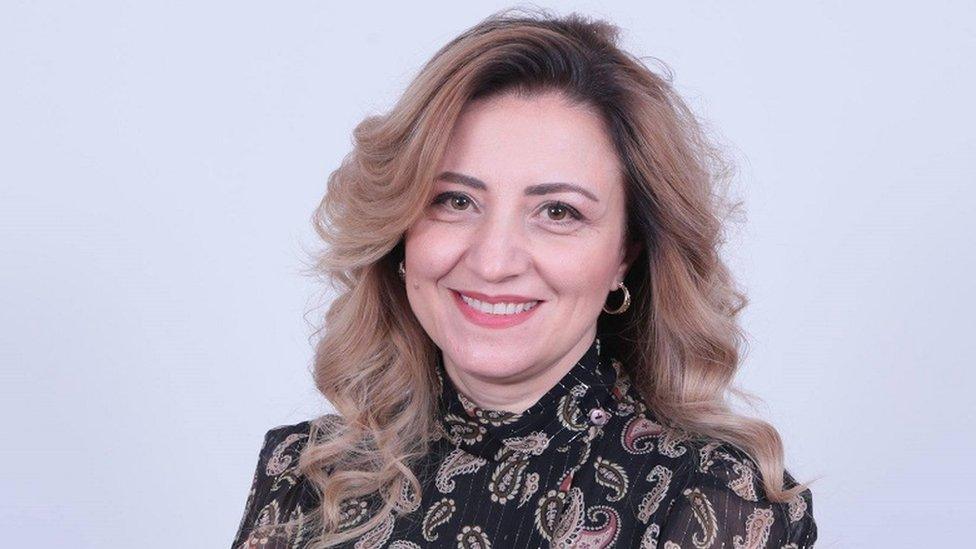
Larina says visiting Scotland marked a turning point in her life
"We were taught how to do a dance to Auld Lang Syne," she added.
"Next to the stone we were singing and holding each other's hands. This warmth has stayed with me. I can feel it now."
In 2001 teachers from Dingwall Academy also took a friendship stone they had made out to Armenia.
Looking back on the trip Larina described it as a turning point in her life.
It inspired her to keep studying English and she now works as an English teacher in Yerevan.
She says: "I really dream about bringing my family to Scotland.
"I am so grateful for what the people there did for us, their kindness and hospitality. They showed us children that we were not alone in this world."